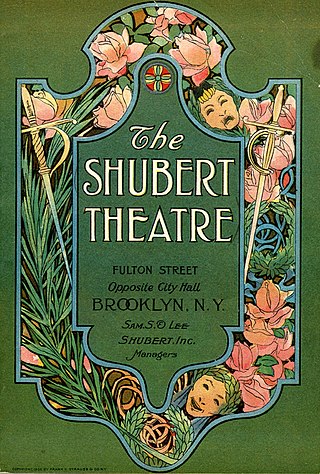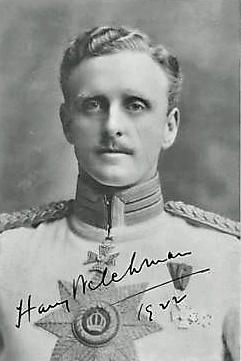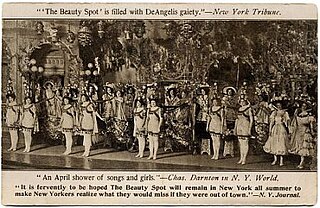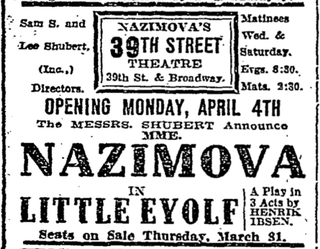
The Prisoner of Zenda is an 1894 adventure novel by Anthony Hope, in which the King of Ruritania is drugged on the eve of his coronation and thus is unable to attend the ceremony. Political forces within the realm are such that, in order for the king to retain the crown, his coronation must proceed. Fortuitously, an English gentleman on holiday in Ruritania who resembles the monarch is persuaded to act as his political decoy in an effort to save the unstable political situation of the interregnum.

The Winter Garden Theatre is a Broadway theatre at 1634 Broadway in the Midtown Manhattan neighborhood of New York City. It opened in 1911 under designs by architect William Albert Swasey. The Winter Garden's current design dates to 1922, when it was completely remodeled by Herbert J. Krapp. Due to the size of its auditorium, stage, and backstage facilities, it is favored for large musical productions. It has 1,600 seats and is operated by The Shubert Organization. The auditorium interior is a New York City landmark.

The Shubert Organization is a theatrical producing organization and a major owner of theatres based in Manhattan, New York City. It was founded by the three Shubert brothers in the late 19th century. They steadily expanded, owning many theaters in New York and across the United States. Since then it has gone through changes of ownership, but it is still a major theater chain.
The Shubert family was responsible for the establishment of the Broadway district, in New York City, as the hub of the theatre industry in the United States. They dominated the legitimate theater and vaudeville in the first half of the 20th century, promoting entertainment attuned to popular taste.

Joseph Calleia was a Maltese-born American actor and singer on the stage and in films, radio and television.

The Shubert Theatre is a Broadway theater at 225 West 44th Street in the Theater District of Midtown Manhattan in New York City. Opened in 1913, the theater was designed by Henry Beaumont Herts in the Italian Renaissance style and was built for the Shubert brothers. Lee and J. J. Shubert had named the theater in memory of their brother Sam S. Shubert, who died in an accident several years before the theater's opening. It has 1,502 seats across three levels and is operated by The Shubert Organization. The facade and interior are New York City landmarks.

The 44th Street Theatre was a Broadway theater at 216 West 44th Street in the Theater District of Manhattan in New York City from 1912 to 1945. It opened and operated for three years as the Weber and Fields' Music Hall. Its rooftop theatre, the Nora Bayes Theatre, presented many productions of the Federal Theatre Project in the mid-1930s. Its basement club became the Stage Door Canteen during World War II.

My Maryland is a "musical romance" with book and lyrics by Dorothy Donnelly and music by Sigmund Romberg, based on the play Barbara Frietchie by Clyde Fitch. The musical takes place in the towns of Frederick, Maryland and Hagerstown, Maryland.
Princess Charming is an operetta with music composed by Albert Szirmai. The English libretto by Arthur Wimperis and Lauri Wylie is based on the Hungarian libretto by Franz Martos. The operetta is set in the Palace of the Elyrian Embassy in the fictional European country of Novia and the Sigman Castle adjoining the Royal Palace. The story concerns a young princess who accepts a proposal of marriage from the elderly king of a neighboring country as protection against an uprising by her own subjects. Captain Torrelli, a military officer sent by the king, fears imminent danger to the princess and marries her himself. The officer then escorts her to his king for an annulment, but the couple fall in love and elope.

Bertha Belmore was an English stage and film actress. Part of the Belmore family of British actors through her marriage to actor Herbert Belmore, she began her career as a child actress in British pantomimes and music hall variety acts. As a young adult she was one of the Belmore Sisters in variety entertainment before beginning a more serious acting career performing in classic plays by William Shakespeare with Ben Greet's Pastoral Players in a 1911 tour of the United States. She made her Broadway debut as Portia in Shakespeare's Julius Caesar in 1912. She returned to Broadway numerous times in mainly comedic character roles over the next 40 years, notably creating parts in the original Broadway productions of Lorenz Hart and Richard Rodgers's By Jupiter (1942) and Anita Loos's Gigi (1951). She worked in several productions mounted by Florenz Ziegfeld Jr., including appearing in the Ziegfeld Follies of 1925 with W.C. Fields and Will Rogers, and starring as Parthy Ann Hawks in the 1929 Australian tour and 1932 Broadway revival of Jerome Kern and Oscar Hammerstein II's Show Boat.

Harry Welchman was an English star of musical theatre. He made several appearances in non-musical plays, but was remembered as, in the words of The Times, "perhaps the most popular musical comedy hero on the London stage in the years between the wars."
Laffing Room Only is a vaudeville revue in two acts by Ole Olsen, Chic Johnson, and Eugene Conrad, with music and lyrics by Burton Lane. This was the first show for which Burton Lane wrote both the words and the music. It was produced by the Shuberts, Olsen, and Johnson at the Winter Garden Theatre, New York City, opening December 23, 1944. Laffing Room Only was staged by John Murray Anderson, with comedy directed by Edward F. Cline, music directed by John McManus, dances by Robert Alton, settings by Stewart Chaney, and costumes by Billy Livingston. The production was supervised by Harry Kaufman. It ran for 232 performances, closing on July 14, 1945.
Jesse C. Huffman (1869–1935) was an American theatrical director. Between 1906 and 1932 he directed or staged over 200 shows, mostly for the Shubert Brothers. Many of them were musical revues, musicals or operettas. He is known for The Passing Show series of revues that he staged from 1914 to 1924 at the Winter Garden Theatre on Broadway, daring alternatives to the Ziegfeld Follies.

The Anco Cinema was a former Broadway theatre turned cinema at 254 West 42nd Street, between 7th and 8th Avenues in Manhattan, New York City. It opened in 1904 and was originally named the Lew Fields Theatre. It continued to operate as a playhouse under various names until it was converted into a movie theatre in 1930. Its block was famous for its concentration of Broadway theatres turned cinemas. After World War II, the street declined and the Anco Cinema eventually became a pornography venue. It closed as a cinema in 1988 and was gutted for retail use. The building was demolished in 1997.

Artists and Models was a series of five theatrical revues staged by brothers Lee and J. J. Shubert at the Shubert Theatre and other theaters operated by The Shubert Organization in New York City between 1923 and 1930.

Daly's Theatre was a Broadway theatre at 1221 Broadway and 30th Street. It was built in 1867 and opened that year as Banvard's Museum but changed its name the following year to Wood's Museum and Metropolitan. In 1876 it became the Broadway Theatre, and finally was named Daly's Theatre in 1879 when it was acquired by Augustin Daly. After 1899, it was operated by the Shubert family. The building was demolished in 1920, after serving as a burlesque theatre and cinema.

The Beauty Spot was a 1909 musical comedy in two acts that played for 137 performances at the Herald Square Theatre in New York with music by Reginald De Koven, a book by Joseph W. Herbert and additional lyrics by Terry Sullivan. The musical provided early appearances for the actresses Lillian Worth and Evelyn Laye.

The 39th Street Theatre was a playhouse in New York City located at the corner of 39th Street and Broadway. Originally called Nazimova's 39th Street Theatre after the actress Alla Nazimova, it was in operation from 1910 to 1925 when it was demolished to make way for an office building. Throughout its existence, it was owned by the Shubert family. Its architect was William Albert Swasey, who had designed or remodelled several other Broadway theatres for the family.

The Straw Hat Revue is a musical comedy revue with sketches mostly by Max Liebman and Samuel Locke, and music and lyrics by Sylvia Fine and James Shelton. It was produced on Broadway in 1939.
Alois Havrilla was an American radio announcer and singer.
















